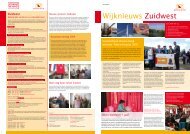freakonomics
freakonomics
freakonomics
You also want an ePaper? Increase the reach of your titles
YUMPU automatically turns print PDFs into web optimized ePapers that Google loves.
There is a strong correlation—a negative one—between adoption and school test scores.<br />
Why? Studies have shown that a child’s academic abilities are far more influenced by the<br />
IQs of his biological parents than the IQs of his adoptive parents, and mothers who give<br />
up their children for adoption tend to have significantly lower IQs than the people who<br />
are doing the adopting. There is another explanation for low-achieving adoptees which,<br />
though it may seem distasteful, jibes with the basic economic theory of self-interest: a<br />
woman who knows she will put her baby up for adoption may not take the same prenatal<br />
care as a woman who is keeping her baby. (Consider—at the risk of furthering the<br />
distasteful thinking—how you treat a car you own versus a car you are renting for the<br />
weekend.) But if an adopted child is prone to lower test scores, a spanked child is not.<br />
This may seem surprising—not because spanking itself is necessarily detrimental but<br />
because, conventionally speaking, spanking is considered an unenlightened practice. We<br />
might therefore assume that parents who spank are unenlightened in other ways. Perhaps<br />
that isn’t the case at all. Or perhaps there is a different spanking story to be told.<br />
Remember, the ECLS survey included direct interviews with the children’s parents. So a<br />
parent would have to sit knee to knee with a government researcher and admit to<br />
spanking his child. This would suggest that a parent who does so is either unenlightened<br />
or—more interestingly—congenitally honest. It may be that honesty is more important to<br />
good parenting than spanking is to bad parenting.<br />
Matters: The child’s parents are involved in the PTA.<br />
Doesn’t: The child frequently watches television.<br />
A child whose parents are involved in the PTA tends to do well in school—which<br />
probably indicates that parents with a strong relationship to education get involved in the<br />
PTA, not that their PTA involvement somehow makes their children smarter. The ECLS<br />
data show no correlation, meanwhile, between a child’s test scores and the amount of<br />
television he watches. Despite the conventional wisdom, watching television apparently<br />
does not turn a child’s brain to mush. (In Finland, whose education system has been<br />
ranked the world’s best, most children do not begin school until age seven but have often<br />
learned to read on their own by watching American television with Finnish subtitles.)<br />
Nor, however, does using a computer at home turn a child into Einstein: the ECLS data<br />
show no correlation between computer use and school test scores.<br />
Now for the final pair of factors:<br />
Matters: The child has many books in his home.









